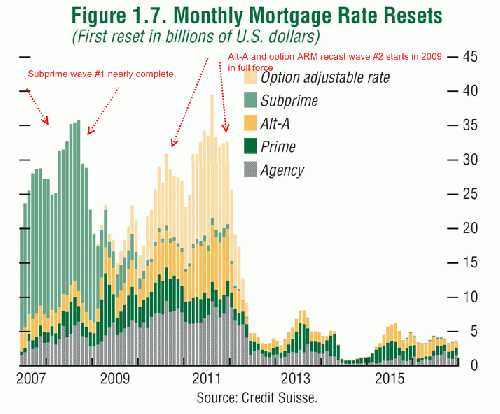First, we are still falling by all accounts, and so is the rest of the world. According to Klaus Schmidt-Hebbel (chief economist for the OECD), the global economic projections are worse than formerly thought:
"The shape of it will be a significantly deeper recession than what was forecast by the IMF in January, at all levels," said Schmidt-Hebbel. "(It will be) significantly deeper and more protracted -- meaning longer than what is embodied in the IMF forecasts of late January."
Another indicator that we are not even close to the bottom is the scheduled resets on an array of Adjustable Rate Mortgages (ARMs). An excellent discussion of this issue was published at Scoop on February 4, 2009, and the following chart is from that article.
As you can see, there is another set of mortgages resetting in the middle of 2010 and an even larger peak in the middle of 2011. While not all of these are "sub-prime," many may be equally weak (Alt-A is incomplete documentation, Agency is government backed loans - Fannie and Freddie primarily, Option is flexible terms including interest only). Given that 20% of homeowners are currently upside down on their mortgages, and the housing values are still dropping, getting in front of this is a major problem.
Add to this growing unemployment, and the credit card hit that has been discussed by others (such as Huffington Post, Time, ABC News), the suggestion that "Hedge Funds Pulling Most of Their Money Out of Market at the End of Each Day," and the indicators point to a fast decline, followed by a another decline, and then perhaps another before we "hit bottom." What is left at the end of this is anyone's guess.
Looking at the various news and articles coming out, I scratch my head when I hear "Things will pick up towards the end of the year." Invariably, these people (including from the Federal Reserve) do not say what they are basing such statements on.
The hope, of course, is that the various stimulus, bailout, and mortgage interventions will have significant positive impacts. Further, that other nations are also successful at slowing and reversing their economies as well. We are not in a world where any nation is likely to recover without others also recovering.
Then there is option 2. As most are probably already aware, a significant part of the U.S. and global economy is actually massive amounts of crime and drug cartel money (see Petras for example). Therefore, I was not completely surprised by Mark Heinrich's Reuters article "Mafia millions buoying banks: UN," or that California is considering legalizing and taxing marijuana. When the economy fails, then the shadow economy comes into the sunlight. I have to wonder if the exigencies of a global economic crisis will result in a new look at the "war on drugs" for example.
______
Background information
What follows is an addendum to my article. It provides additional information that may be of interest.
In trying to make sense of the economic mess, I feel like I am engaging in a self tutoring in economics, the stock market, and the arcane world of finance. I will try to share my "lay person's" understanding of the concepts and terms and how they fit into the bigger picture.
As nations throw money at the banks, the financiers, and finally at "stimulus," it has not seemed to have much effect. Sometimes pictures are worth a thousand words. Here is the M1 Money Multiplier as an ALFRED Graph from 2/11/2000 to 2/11/2009 (the last date for which the graph is currently calculated and also available at this link).
If you want to wade through the actual formula for the M1 Money Multiplier, it is elaborated here. As I understand the M1, it is the amount of money available for each dollar in reserves (or the monetary base). In other words, if the M1 is 1, then for each dollar put into the system one dollar comes out. If the M1 is 2, then for each dollar into reserves two comes out. The ALFRED was started in 1984 and is produced by the St. Louis Federal Reserve. Here is a more extended graph (also available here).
So the M1 reached a high of about 3.1 in about 1987, and has trended downwards since then. In fact, it dropped off a cliff the end of 2008, and actually dropped below 1 in January 2009. In other words, we clearly are in very different territory. In January, for every dollar that went into the reserve system less than a dollar came back out.
(Note: You can view every article as one long page if you sign up as an Advocate Member, or higher).





